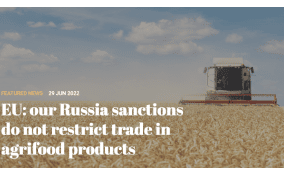The EU’s ‘press and information team of the Delegation to Namibia’ has issued a wide-reaching statement to try to dispel ‘Russian disinformation’ regarding the ‘disruption of agricultural production and trade in Ukraine and the spike in global food prices,’ which, it said, ‘is not caused by EU sanctions – but the very own actions of the Russian Government, such as:
- the blockage of Ukrainian ports;
- the deliberate destruction of Ukrainian agricultural facilities; and
- restrictions imposed on its own export of agricultural products and fertilisers.’
The statement seeks to challenge a long list of misconceptions, saying, ‘Russia should put an end to these actions as this will immediately resolve the looming food crisis.’ It noted that, agricultural products can be imported into the EU from Ukraine and transferred to third countries, and that ‘there are no EU sanctions on imports from Ukraine whatsoever. Even products from the non-government controlled areas of the Donetsk and Luhansk oblasts can be imported, under certain conditions (if examined and approved by the Ukrainian authorities).’
The statement goes on to say: ‘Phytosanitary products, including herbicides, fertilisers and agricultural machineries can be exported from the EU to Ukraine without restrictions!
‘The restrictions on import of certain potash fertilisers under the EU sanctions on Russia and Belarus only apply to products imported to the EU and do not concern exports of them to Ukraine from the EU or from Russia. There is no cap or EU restriction for import of phytosanitary products as final products.
‘Public financing or financial assistance for trade to Ukraine is not restricted!’
It said that any EU company can invest and support agricultural production in Ukraine, except in the non-government controlled areas of the Donetsk and Luhansk oblasts, Crimea or Sevastopol; there are no EU sanctions targeting ancillary services for importing agricultural products into the EU from Ukraine and transfer them to third countries, and that ‘EU companies can transport by road, air and sea agricultural products from Ukraine directly to the EU and onwards to partners, including via Ukrainian companies or any other non-sanctioned non-Russian companies.’
As regards EU sanctions and the export of agrifood from Russia and Belarus, it said: ‘
- EU sanctions cover only bilateral trade between the EU and Russia – not international trade!
- EU sanctions have no extra-territorial effect. Third country persons and firms can import agrifood from Russia under EU sanctions if they do that entirely outside the EU
- EU’s sanctions excluded a limited number of Russian banks from the SWIFT network. Banking relations via SWIFT can still continue via the other Russian banks
- Agricultural products in Russia are not targeted by EU sanctions!
- EU sanctions do not prohibit EU businesses to purchase, import or pay for Russian agricultural products, provided that sanctioned persons are not involved. The EU has carefully avoided a direct and comprehensive ban on the import of Russian agricultural products.’
It also clarifies that EU Member States ‘can grant access to EU ports of vessels flying the Russian flag, as well as entry to the EU of Russian road carriers for the purposes of importing or transporting agricultural products, including fertilisers and wheat, that are not subject to prohibitions.’




